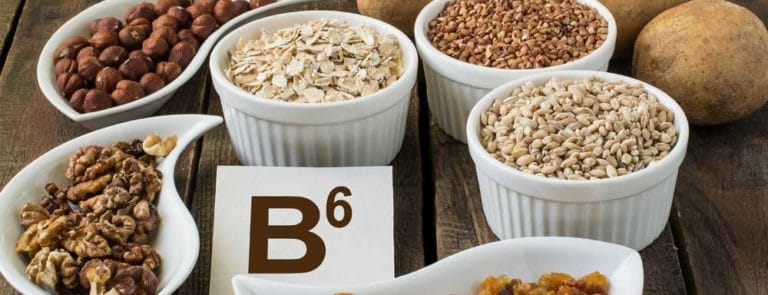10% off £30 OR 15% off £40
Guide to vitamin b6

What is vitamin B6 and what does it do?
Vitamin B6, also known as pyridoxine, is one of the family of eight B vitamins that our bodies need to stay healthy.
It is water soluble, which means that it cannot be stored in our bodies, so we need to get enough in our diets every day.1
Vitamin B6 is needed for:2,3
- the brain and nervous system
- normal immune function
- releasing energy from your food
- haemoglobin for red blood cells
- regulating hormones
- helping to reduce tiredness and fatigue
You can get all the vitamin B6 you need from a healthy balanced diet.4 Rich sources include seafood, lean meat, chickpeas, poultry, potatoes and bananas.5
A lack of vitamin B6 is rare in healthy, younger adults, but can be more common in elderly people who may have poor eating habits. Symptoms include numbness in the hands and feet (peripheral neuropathy) and anaemia.6
Functions of vitamin B6: what does vitamin B6 do in the body?
Vitamin B6 is needed for healthy nervous and psychological function, helping to support the neurons transmitting messages around the brain.7
It’s critical for releasing energy from our food – it helps our bodies keep blood glucose levels steady, and is needed by more than 100 enzymes that process the proteins, carbohydrates and fat we eat.8,9
Vitamin B6 also helps make haemoglobin, used by red blood cells to transport oxygen around the body and supports healthy immune function.10
How much vitamin B6 do I need?
The reference nutrient intake (RNI) is 1.2mg a day for women and 1.5mg for men.11
How much vitamin B6 do children need?
- 1-3 years – 0.7mg a day
- 4-6 years – 0.9mg a day
- 7-10 years – 1mg a day
- 11-14 years – girls 1mg a day, boys 1.2mg
- 15-18 years – girls 1.2mg a day, boys 1.5mg12
Vitamin B6 foods: which foods are the best sources of vitamin B6?
Food sources of vitamin B6 include:13
- pork
- poultry
- fish
- eggs
- chickpeas
- fortified breakfast cereals
- wholegrains, like porridge oats and brown rice
- bananas
- soy beans and tofu
- peanuts
- milk
What are the symptoms of a vitamin B6 deficiency?
Vitamin B6 deficiency is rare in healthy adults and children, but older people (particularly those with poor diets or malnutrition) are more at risk.14
A lack of vitamin B6 can lead to a condition called peripheral neuropathy, a type of nerve damage. Symptoms include numbness and tingling in the hands and feet.
Other symptoms of vitamin B6 deficiency include:15
- a sore, swollen tongue (glossitis)
- poor cognitive function
- seizures
- anaemia
- fatigue and low energy
- weakened immune function
What happens if I consume too much vitamin B6?
Taking more than 200mg a day of vitamin B6 for long periods is known to trigger peripheral neuropathy. This can be permanent, so make sure you never consume too much.16
High doses of vitamin B6 can also cause sores on the skin, sensitivity to sunlight, and digestive troubles, including heartburn and nausea.17
Should children take vitamin B6 supplements?
Just as with adults, a healthy, balanced diet should provide all the vitamin B6 your child needs.18
Should women take a vitamin B6 supplement during pregnancy?
Chances are, you get enough vitamin B6 from your diet. However, it’s thought to be safe to take at normal doses during pregnancy.19
What are the potential benefits of taking a vitamin B6 supplement?
Vitamin B6 supplements can help maintain normal levels of the amino acid homocysteine. Raised levels of homocysteine have been linked to conditions such as cardiovascular disease and stroke.20
Before taking any supplements or minerals, it’s best to make sure you’re getting all the nutrients through your diet first. Food supplements must not be used as a substitute for a varied and balanced diet and a healthy lifestyle.
Last updated: 4 August 2021













